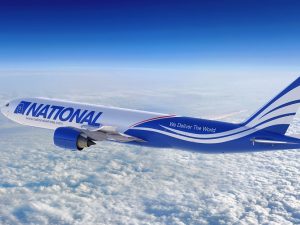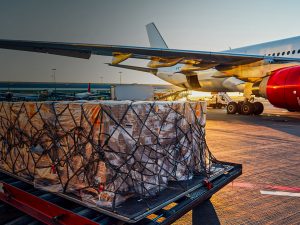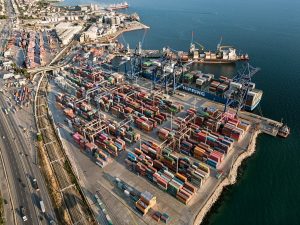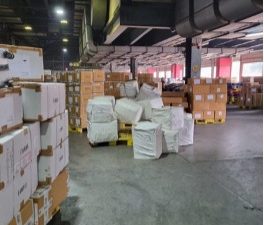Amrutesh Reddy, Director, NDR InvIT Managers says, “The Union Budget 2024-2025 presents a compelling landscape for the warehousing and InvIT sectors. We see significant potential in the government’s robust infrastructure allocation of ₹11.11 lakh crore as announced in the Interim budget. The announcement of 12 new industrial parks and the focus on industrial corridors are set to boost demand for modern warehousing facilities. The budget’s emphasis on e-commerce export hubs for MSMEs and initiatives for solar panels align perfectly with evolving market needs and sustainability goals for warehousing. These measures, coupled with the push for green transition and development of essential infrastructure, create a favourable environment for InvITs to thrive. We anticipate that the government’s commitment to infrastructure financing will drive growth in our sectors. As we navigate this dynamic landscape, NDR is well-positioned to capitalize on these opportunities, delivering value to our investors while contributing to India’s infrastructure development journey.”
Read More »‘Phase 4 of PM Gram Sadak Yojana will be game changer for rural India’
Gurdeep Singh, Chairman and Founder, Jujhar Group says, “The Finance Minister’s announcement of Phase 4 of the PM Gram Sadak Yojana is a game-changer for rural India. Providing all-weather roads to 25,000 habitats will significantly enhance connectivity, ease logistics, and boost the rural economy. The proposal to develop DPI applications at a population scale for the services sector is equally transformative. It promises productivity gains, business opportunities, and innovation, particularly benefiting logistics, MSMEs, services delivery, and urban governance. This budget reflects a strategic vision that will drive sustainable growth and development across sectors.”
Read More »‘E-com export hubs will aid MSMEs in exporting local products’
Sunil Kohli, Managing Director, Rahat Cargo says, “The budget has evidently focused on infrastructure, manufacturing, and skilling which are vital for long-term development. This strategic allocation aims to establish India as a global logistics and manufacturing power centre. The budget convincingly reflects optimism about supporting innovative entrepreneurs in this ecosystem. The government’s initiative to set up e-commerce export hubs to aid MSMEs in exporting local products is considered a significant move to drive growth through innovation. It would also help accelerate exports of leather products & textiles. And the creation of industrial centres in historic hubs such as Gaya in Bihar under the ‘Vikas bhi, Virasat bhi’ scheme is expected to boost infrastructure development and subsequent creation of employment. Overall, the budget is growth oriented keeping various futuristic key factors in mind.”
Read More »FM focuses on MSMEs, road infra, e-com hubs
To achieve the goal of ‘Viksit Bharat’ 2047, Union Finance Minister Nirmala Sitharaman presented her seventh consecutive Budget in the Lok Sabha today for the financial year 2024-25. It is the first full budget by the BJP-led NDA government since it was re-elected in June. The Finance Minister’s allocation of ₹26,000 crore for highway development in Bihar, including the construction of a two-lane bridge over River Ganga and development of highways such as Patna-Purnea Expressway and Buxar-Bhagalpur Expressway, will benefit highway construction sector. Investment-ready plug-and-play industrial parks are to be developed in or near 100 cities. Giving the much-needed boost to MSMEs, Sitharaman said the limit for MUDRA loans for MSMEs has been increased from Rs 10 lakh to Rs 20 lakh for those who have availed the loans before and repaid. Focusing on large-scale perishable clusters near ports and airports for full consumption, she said emphasis will be laid on pharmaceutical R&D and production. e-commerce export hubs will be set up in PPP mode to promote Indian goods globally and to facilitate cross-border trade. Focus on e-commerce hubs will help the D2C ecosystem, including small vendors and aggregators, to bring in efficiency in their operations and improve accessibility to markets, including exports. Seafood export touched all-time high of over Rs 60,000 crore, the Finance Minister said, adding that steps will be taken to adopt technology for digitisation of businesses.
Read More »National Airlines orders four B777Fs to expand global operations
National Airlines has for the first time ordered four Boeing 777 freighters to expand global operations. The airline currently operates nine Boeing 747-400Fs. The newbuild 777Fs will help the airline modernise its fleet, increase cargo capacity and fly long haul routes. “We are elated by this remarkable order of four Boeing 777 Freighters. This demonstrates our commitment to offering efficient, resourceful, and modern air freight services to support our global customers’ increasing transportation demands,” said Christopher Alf, chairman of National Airlines. “The order affirms our fleet growth plan as we enter into the next chapter of National. We sincerely appreciate the support by Boeing and all its associated teams in this journey ahead.”
Read More »Customs clearance time for imports drops 6% at ACCs: CBIC
The Central Board of Indirect Taxes and Customs (CBIC) released the National Time Release Study (NTRS) 2024 report which aims to present a quantitative measure of cargo release time. It has noted that here has been 6% reduction in release time in case of Airport Cargo Complex (ACC) and 50% reduction in case of Integrated check posts (ICPs) compared to the corresponding period in 2023. On export end, the study underlined that the time of the arrival of the cargo at the customs station/port to its regulatory clearance, marked by grant of Let Export order (LEO) has reduced for ICDs and ACCs in 2024 vis a vis 2023. In absolute terms, the average release time taken in the export Customs clearance regulatory process, in 2024, stood at 22:49 hours for seaports, 30:20 hours for ICDs, 3:50 hours for ACCs and 5:28 hours for ICPs. Whereas, for imports, the study indicated that, out of the 15 ports covered under the purview of the study, 9 ports have witnessed a reduction in the average release time in 2024 vis-a-vis previous year.
Read More »DFW, CCUB unite to extend partnership for Cold Chain Unbroken 2024
Milton De La Paz, Vice President – Airline Relations and Cargo Business Development at Dallas Fort Worth International Airport (DFW) has agreed to join the Advisory Board for Cold Chain Unbroken (CCUB) 2024, said an official LinkedIn Post. “His expertise will undoubtedly elevate the event to new heights,” the post added. The announcement was made when Dhiren Sanurag Lakkaraju, Co-founder & Chief Operating Officer met De La Paz recently not only to talk about business but also to acknowledging the invaluable support DFW has provided to CCUB since its inception. “As a long-standing partner, DFW has been instrumental in our journey towards an unbroken cold chain. We look forward to having DFW as an esteemed partner once again this year. Together, we’re not just discussing the future of cold chain logistics—we’re shaping it! Stay tuned for more updates on CCUB 2024, coming to Hyderabad on September 19-20, 2024. It’s going to be our biggest and most impactful event yet,” the post added.
Read More »DHL signs agreement to promote sustainability in logistics biz
DHL Group and Envision Group, a global green technology company have signed a strategic partnership agreement to foster a comprehensive cooperation in logistics solutions and mutually accelerate the progress of sustainability targets. The partnership covers four main areas like logistics solutions, Sustainable Aviation Fuel (SAF), green energy, and the joint development of a ‘Net Zero Industrial & Logistic Park.’ The partnership will combine DHL Group’s extensive logistics expertise with Envision’s knowledge of renewable energy solutions, aiming to accelerate the advancement of environmental energy initiatives. Both companies are committed to sustainability with targets to reach net-zero emissions, said a statement.
Read More »DP World completes merger to form major logistics hub in Türkiye
DP World and Turkish Evyap Group completed a strategic merger that will combine two major ports on the Marmara Sea and create a new international logistics hub. The port merger will enhance Türkiye’s critical role in global trade, the two companies said in a joint statement after receiving regulatory approval from the Turkish Competition Authority (RK). The newly formed entity, DP World Evyap, sees DP World assuming a 58% stake in Evyapport, while Evyap Group secures a 42% share of DP World Yarımca. The rebranding will introduce “DP World Evyap Yarımca” and “DP World Evyap Körfez” as the new names for these key maritime gateways. “DP World Evyap will help meet the increasing demand for sophisticated logistics in the region, boost Türkiye’s export and import volumes, open up the growth of new sectors and strengthen the country’s growing status as a major hub in international supply chains,” the statement read. The combined entity will offer 2,088 meters (6,850 feet) of berthing space, accommodating more than one ultra-large container vessel at each terminal simultaneously. The total annual container handling capacity will exceed 2 million TEUs. The integrated operation will also handle project and heavy-lift cargo services. DP World Evyap will benefit from advanced road and rail connections and expedited turnaround times, supported by over 900 logistics experts dedicated to optimizing cargo movements.
Read More »DCSC records impressive surge in cargo volumes in July
Delhi Cargo Service Center (DCSC) records a significant uptick in cargo handling, setting new benchmarks for efficiency and throughput since the beginning of 2024. According to Avinash Razdan, Group CEO, Cargo Service Center, DCSC has witnessed a substantial increase in both export and import cargo volumes. Till Mar 24, DCSC was handling an average of around 700 tonnes of export and import cargo in a day. “Since 15 June, we have been consistently handling an average volume of 850-950 tonnes of cargo a day, and even crossed 1100 tonnes on the 12 July,” said Razdan. This was only made possible by the single-minded determination of our people to facilitate the increasing cargo to fulfil the dream of Govt of India and the industry of processing 10 MMT of air cargo by 2030. We are proud of our team and especially of the executives working on floor who have displayed highest levels of commitment beyond the call of duty. The surge in cargo shipment handling reflects DCSC’s commitment to providing seamless operations, reliability, and heightened efficiency in the dynamic field of cargo services. The success story of Delhi Cargo Service Center serves as a testament to the resilience and capabilities of the team, positioning the organization as a leading player in the cargo handling industry. As the company continues to reach new heights, industry observers are keenly watching for the strategies and practices that have contributed to this remarkable performance.
Read More » Cargo Breaking News
Cargo Breaking News









